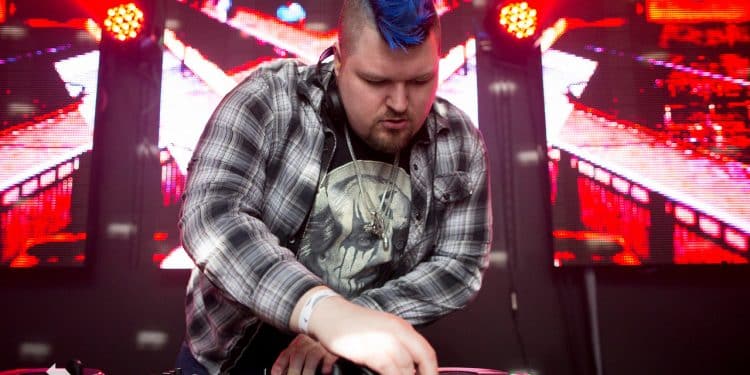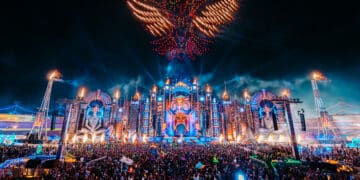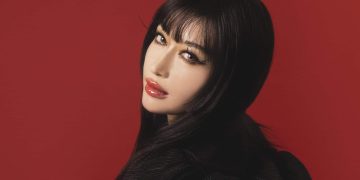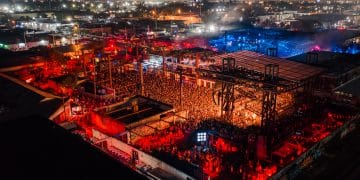Iconic artist Paul Oakenfold sat down with us in San Francisco to reflect on the dance music scene’s past and where it will go in the future.
Few of today’s producers and DJs hold a flame to Paul Oakenfold. With a career spanning over four decades, a record label celebrating its 30th anniversary next year, and an impressive backlog of accomplishments, he stands as one of the authoritative voices in the space. He has reached a caliber few others have with no plans of slowing down.
Paul Oakenfold continues to push boundaries with his own music – his latest being a contemplative and introspective album, Shine On, born from isolation during the pandemic – making history with live sets across the globe and elevating rising voices in the scene. Recently, he concluded a North American tour run as support for New Order and Pet Shop Boys. This perfect combination of three pioneering acts of ’80s new wave and dance music set stadiums across the US on fire.
We had the pleasure of speaking to Oakenfold after the penultimate San Francisco stop at Chase Center. It was surreal to be sitting in the lobby of the Westin St. Francis across from someone whose music I’ve been listening to for nearly 20 years, even before I truly fell in love with electronic music. He was gracious, and we had a lovely conversation about everything from his early days in London, creating during the COVID pandemic, the challenges of playing a set on Mount Everest, and Perfecto Records’ legacy.
Listen to Paul Oakenfold’s latest album on Spotify or your preferred platform, and continue reading for our conversation.
Stream Paul Oakenfold – Shine On on Spotify:
Hello, good to see you again after your performance last night! It was so much fun, we were up dancing and singing along, having a great time. I, unfortunately, missed your first set, but was it similar to ‘80s and ‘90s dance music?
The first set is more me, more clubbier, so there’s a balance. The set changes depending on how I feel and where we are. In Minneapolis, I played a bunch of Prince. In New York, I played a lot of old-school hip hop from Grandmaster Flash to Beastie Boys, Run DMC, and some old disco. In Chicago, a lot of house music. Tomorrow I’m playing Nirvana since we’ll be in Seattle.
But overall, the demographic is older, so that second set is new remixes, new productions, and more current versions. So it’s fresh and new, but you know the song. A lot of thought goes into the process, but as soon as you drop “Don’t You Want Me Baby” the whole place is singing along. [laughs] But again, that was Purple Disco Machine’s brand-new version.
You’re taking your Legends set on tour around the country as well. It’s an ode to ‘80s and ‘90s dance music, was your set last night a taste? How are you translating that music into today?
It’s based more on my world, a lot of trance classics. I’ve done over 115 remixes, so it’s a lot of those moments from that ’80s and ’90s period and some of those classics that we all love that I didn’t have anything to do with. It’s been working really well.
Yeah, I can only imagine. We announced your show in New York, and I wish I could have been there.
New York, I wanted just to play Blondie’s “Rapture,” Grandmaster Flash and the Furious Five, or Kurtis Blow. I even played “Trans-Europe Express” by Kraftwerk. That was fun! Madison Square Garden was fun. And then in Brooklyn Center, I ended on Beastie Boys’ “(You Gotta) Fight For Your Right (To Party).”
I bet everyone loved that. You also recently released your Apple Music mix that is focused on the London club scene of the late ‘80s. Take us back to when you were running Future at Soundshaft and like what that was like, the vibe and energy.
Where I am today, in terms of this tour, playing Stone Roses, Happy Monday, Charlatans, The Cure, Prince… I’ve remixed all these, and even the modern, new mix is my mix. It all stems from that moment: The Future Club. The Future Club was a small club in London, 600 people, I think, where I played Indie rock with house music. That’s how I started to get asked to remix all these tunes. It really stems from those days.
It wasn’t a deliberate approach to retake rock records and turn them into dance records. The record companies would ask me, “Can you remix The Cure?” I love The Cure, so I’d say, “Okay, let me hear it.” Well, the drums and the rhythm don’t work because these are live bands. For DJs, you need a tight rhythm to mix; otherwise, it goes out of time. So that’s where it really started, and suddenly, I was doing all these Indie records, big bands like NXS, Rolling Stones, U2. It all comes from that club.
That’s amazing. The world of dance music has evolved so much. To go back to that, have it be simple, and be there for the music… I wish I could have experienced that because the scene feels a lot more commercialized now.
I hate to say this, and it’s a strange moment because I don’t want to say that it was better back in the day. It was different, but it was better, and here’s why. If you really analyze it and think about it, you’d go to a club where you would hear a DJ who would source some fine music and tell you a story. You would go to The Future, you would hear a tune, and you’d be like, “Oh my god, what is that? I love that.” You can only ever hear that tune by that DJ in the club.
Now that still exists. But [phones] have really spoiled it for all of us. Now, you hold your phone up, and you Shazam it, so you know it. It takes the specialness away from the tune. You are filming it, and you’re not in the moment. That moment is special. Why is it special? Because it gives you a memory where you and I go, “Wow, remember when we did that? And we were one-on-one?” That’s what we miss now, not just in clubs, but in life.
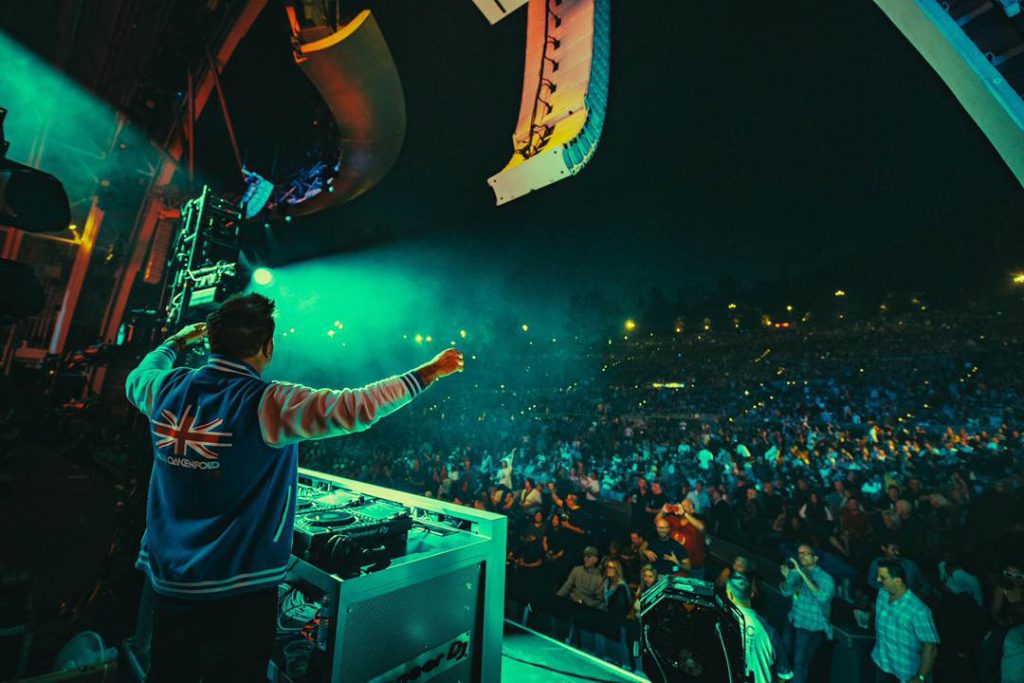
Right, everything is so flash in the pan. Even with music releases, people are putting out singles or mixes because it’s like they’re trying to strike it while it’s hot, but you’ve continued to release albums. Shine On came out earlier this year, and it’s very different from anything you’ve done.
Yeah, as a progression as an artist, you grow. I started to work more in cinema. I was scoring, I was writing for games, and I needed a creative challenge. Then COVID popped up, and I found myself in that space where I wasn’t collaborating like I was on my last two albums, meaning I wasn’t in the room with you. I was in the room on my own, calling or on Zoom going, “Ok, here’s an idea, can you write something on it?” It was so demoralizing because if me and you are together in the room, I can go back and forth. If we’re not, it just keeps going – there are misunderstandings.
I spent a lot of time, like everyone, on the sofa, watching movies, and then I’m like, “Okay, why don’t I go a cinematic route?” I’ve done a lot of homework, and I’ve worked on a picture. I don’t really want to listen to a dance album. I want to listen to a dance compilation, or I want to go to a club and hear dance music, but I’m 17 months without playing, so let me write how I feel. And let me set myself a challenge, a creative challenge to try to stay healthy in that COVID moment.
I live on my own, and I took it as we all did, really, really serious. I didn’t leave my home. I was on a real lockdown. Now, my friends, some of them were going stir crazy and broke the rules. They were going partying, and I’m like, “don’t come nowhere near me.” I was on a severe lockdown, so I just jumped to the studio, and I came up with Shine On. So it’s very cinematic, it’s very emotional.
You worked with a 75-piece orchestra, right?
Yeah, through my friend, who was an orchestrator. He put it together from outtakes that he had. So again, it wasn’t in a room with 75 people. It was a really creative process, like “What keys is it in? Can we try this? Can we try that?” So there’s a 75-piece orchestra on some of the tracks, but they’re not in the room, and they weren’t together. It was difficult. [Laughs]
Obviously, it’s an obstacle to not be in the room with them, but the fact that you pulled it off is amazing. And then, thinking about your collaborators, were there any that pushed you to the next level, given the constraints of producing the album during the pandemic?
My favorite track on the album is called “Pray For Me,” and that collaboration was amazing because the lyrical content is very strong. That song is a cry for help. An individual has lost his way. We all lose our way. The song touched me in many ways and was a very, very meaningful track.
A difficult one to do, really, when you’re working from afar, was with Azealia Banks. That was tough, and that really pushed me. I love Baby E, he’s a very great talent. The Luis Fonzi track “The World Can Wait” is based around COVID. We were all up until COVID, in our own minds, so busy. The world stopped. We had to think about ourselves, our family, and our friends, the world could wait. Now we’re back in the game, and we’re all frantic now.
“Waterfall” with Lizzy Land is pretty deep, lyrically. I was hoping that people would listen to the album during COVID, but what happened was there was no one working on the record because no one was working. So it didn’t come out until after, really.
That’s true; it came out in January, but as you’re able to play it out now, do you notice if there’s a specific track that resonates really well with the fans? How is the response from your side of the decks?
The response is honestly mixed. I made it during COVID, but it’s not a dance record. I think it’s something that needs time, but we don’t have time, unfortunately. According to Beatport, there are generally 20,000 dance records released weekly, you can’t stay on top of it. The one thing about music now is you could have hit two or three years later. There is no time limit on music. You used to have a moment, you promote it, you release it, you support it, and now you just throw it against the wall. If it sticks, it sticks.
Right promotion is so different now, especially with social media.
Yeah, so you just have to keep going with promotion, you know? That’s the problem.
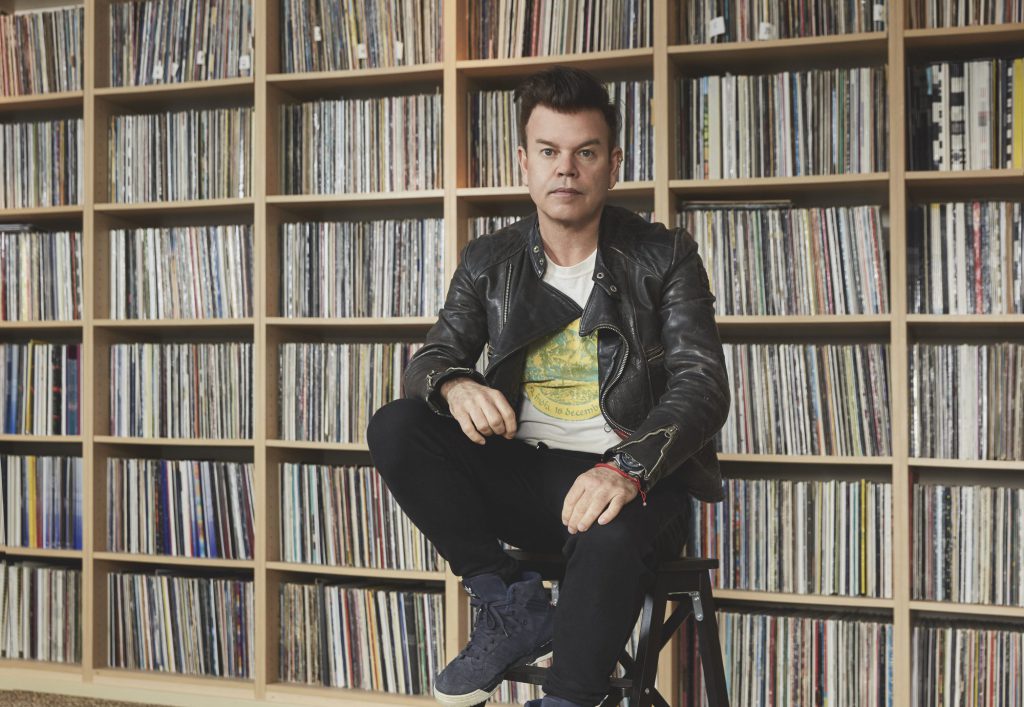
Well, your label, Perfecto Records, is celebrating 30 years next year, and Perfecto Black just has its 100th release, all big milestones! Thinking about the future of the label, what is your vision? Are there any artists you have your eye on to shape the label?
Velvet Cash is a big priority for us next year. I’m looking forward to working with Baby E. I want to get back to what I really enjoyed about music. I come from a background where I find an artist, I work with them, develop them, spend time with them, disagree with them, and encourage and support them. That’s kind of where I’m at and what I’m looking forward to doing.
Do you have anything big and special planned for the 30th anniversary?
I’ve got some DJ collaborations with various artists from the label. We’ve got some shows that we’re going to do. The biggest thing is we got a documentary, a 30-year documentary spanning from the early days of some of the artists that I signed, right up until the future because the label is always about finding tomorrow’s star today. It is a retrospective of a label that’s sold over 10 million records, a label that signed David Guetta, Mark Ronson, all these names in the early days. We had the likes of Tiesto on the label, we had some big – well, they weren’t big when we signed them [laughs] – but now, you know, they’re huge. So yeah, it’s going to be exciting and interesting.
Yes, you’ve seen the evolution of dance music. Even now, you see a resurgence in techno; there are trance sounds in techno and vice versa. Even though people have said they’ve moved on with their genres, everything blends together.
Trance music is slowed-down progressive music. That’s what it is. To some of the DJs I know, I’m like, “you do know the playing trance. Just trance at 120 BPM.” You’ve got artists like Vintage Culture, who’s done a trance rework as a progressive. It’s great because these younger new artists are taking samples or replaying all the old trance records and putting them at 120 BPM. And I’m like, okay, some of them don’t even know it’s trance!
Yeah, everything’s very cyclical. The trends come in cycles.
They sure do.
You’ve done so much this year already, like playing Patagonia…
I got invited to go to the mountains of Patagonia and do this show, and I’m like, “Okay. Has anyone done this? So I’m the guinea pig.” [Laughs]
But you did Everest! [Laughs]
Well, Everest was difficult because we never even knew if the equipment would work. We had to put the equipment on the side of yaks, and it was bouncing up and down. There was a lot that went on. It was really difficult. For [Patagonia], we’d fly the equipment up. It was on one of the highest points in the mountain, and it was in the winter there. We did two parties, one high in the mountains for only 100 people because you had to get your way up there, and then we did one at a ski resort with 3000, but that was wonderful.
I end up doing these events, parties, whatever you want to call them, in strange places; the Great Wall of China, Area 51, Mount Everest, Stonehenge, Ushuaia… But Patagonia is a beautiful range of mountains. We hiked, we sat there and watched the sunset. If you ever get the chance to go, you should.
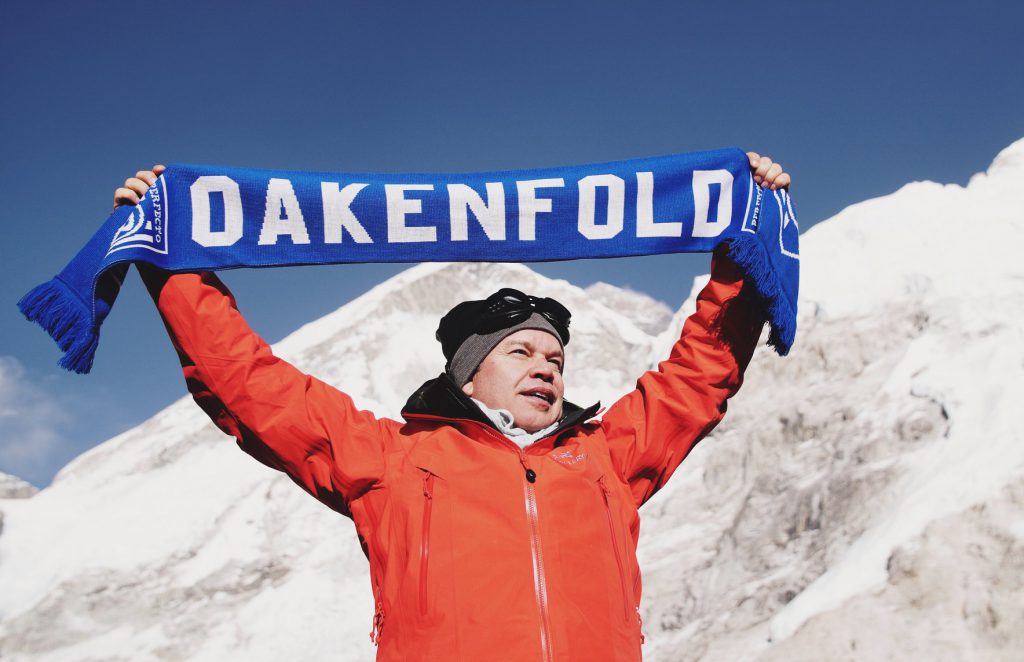
I’ve seen the photos. It looks like nothing of this world, so hopefully, one day. But this year you’ve also written your autobiography…
This is the second one I’ve done, and I thought, “I’ll do it if it’s not a kiss and tell because I don’t want it to be. It’s not who I am. So let me think about this. If I’m gonna do it, what’s the meaning? What’s the subject matter? What do I want to say?” And it led me to my struggle with school because I’m dyslexic, and difficulty that I had. Why not tell the story of a struggling boy who didn’t know he had something wrong with him? But out of music came a story, came a path that ended up successful. So the moral behind is that you can do it. Anyone can do it, and don’t let society or people around tell you you can’t.
That’s incredibly inspiring. We’ve talked about how you push the boundaries with your shows, you’ve written your autobiography, and you’re on tour with New Order and Pet Shop Boys, but is there anything on the horizon that fans can look forward to?
I’m really enjoying this tour. I finish this, and then I’ve got a month doing my own shows. Then I’ve got three weeks off for the studio, and then I go to Asia, so that ends the year. And then next year is about Perfecto and about the artists that I want to help me support and DJ collaborations. I want to get back to just doing some collaborations with new talent that I respect, and some of the older talent that, you know, I’ve grown up with, and just being in the moment, really.
I love our scene. I mean, we’ve got a great community, and it’s good to be a part of it.
And as one of the pioneers of the scene. You’re really shaping the story and the history.
Yes, thank you for saying that. We went from vinyl to CD to USB stick or laptop, and when you pull out vinyl, and you’re playing, it’s live. Some tracks are three minutes long, and the drums are going out. It’s so much fun just getting lost in the true essence of what music really is about.
I say to new artists that sign to my label, you have to see some of the true pioneers and great DJs before they hang their headphones up: Danny Tenaglia, David Morales, Tony Humphries, John Jelly Bean Benitez, Grandmaster Flash, DJ Scratches. They take me back to the true art of DJing, and now it’s gone. It really is gone, and it’s such a shame. So that’s why I say to the younger artists on my label, “If you want to be a DJ, go check this guy out. Want to really know how to tell the story through music? Know when to pause. Let it breathe.”
Well, that’s great, and I completely agree, having seen some amazing vinyl sets. I have one last question I always like to ask, related to music or not, what is one thing you are obsessed with right now?
Chelsea soccer. Even my mom knows all the players on TV. As a kid, your father takes you to your first game, so there’s a whole process. One moment in every kid’s life, I believe they would have wanted to be a football player. So you grow up becoming obsessed with your local team. Wherever that team is, however good they are, that’s your team. My team didn’t do well for 20 years, but they’re your team, and then suddenly, they did well. So yeah, you become obsessive. So wherever we are in the world, we’re like, “What time is the game on? Where can we go to watch it?” Technology has made it easier.
American football doesn’t have the same following, but I completely understand. [laughs] Well, thank you so much for your time. I really appreciate it!
You’re welcome! Very nice to see you again!
Follow Paul Oakenfold on Social Media:
Website | Facebook | Twitter | Instagram | SoundCloud | YouTube



